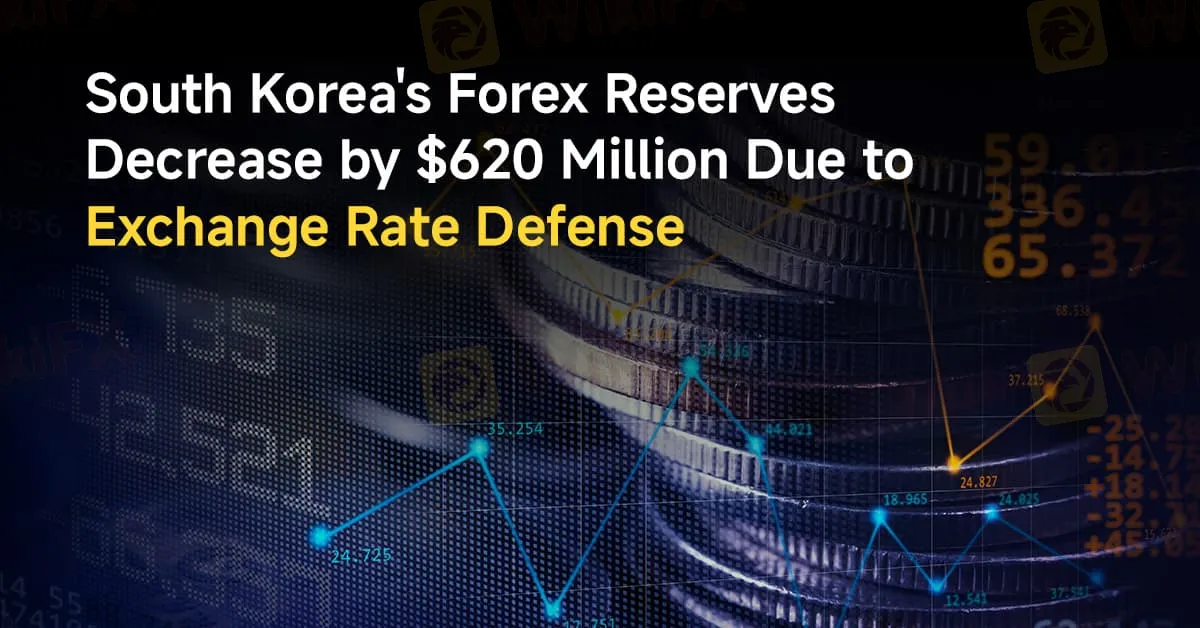简体中文
繁體中文
English
Pусский
日本語
ภาษาไทย
Tiếng Việt
Bahasa Indonesia
Español
हिन्दी
Filippiiniläinen
Français
Deutsch
Português
Türkçe
한국어
العربية
South Korea's Forex Reserves Decrease by $620 Million Due to Exchange Rate Defense
Abstract:As of the end of May, South Korea's foreign exchange reserves were ranked 9th globally, reflecting its robust position in international markets despite the recent adjustments.

As of the end of May, South Korea's foreign exchange reserves were ranked 9th globally, reflecting its robust position in international markets despite the recent adjustments.
South Korea's foreign exchange reserves experienced a decline of $620 million in June, influenced by various financial activities aimed at stabilizing currency exchange rates. According to the Bank of Korea's “End of June 2024 Foreign Exchange Reserves” report released on the 3rd of July, the country's reserves stood at $412.1 billion by the end of June, marking a decrease from the previous month.
The reduction in reserves can be attributed to several factors. Despite an increase in foreign currency deposits at financial institutions, primarily driven by the typical end-of-quarter effect, significant outflows were observed due to the repayment of foreign exchange stabilization bonds (FESBs) and foreign exchange swaps with the National Pension Service. Additionally, the appreciation of the U.S. dollar contributed to a decrease in the converted value of non-dollar foreign currency assets.
The Bank of Korea clarified, “The decrease in reserves was largely due to the maturity of FESBs and the settlement of foreign exchange swaps, coupled with the impact of a stronger U.S. dollar on the valuation of our foreign currency holdings.”
However, the central bank reassured that this decline is temporary, anticipating a reversal with the issuance of new FESBs scheduled for July. This issuance is expected to bolster reserves in the upcoming months.
The management of foreign exchange reserves plays a crucial role in South Korea's economic strategy, ensuring stability and resilience against global financial fluctuations.

Disclaimer:
The views in this article only represent the author's personal views, and do not constitute investment advice on this platform. This platform does not guarantee the accuracy, completeness and timeliness of the information in the article, and will not be liable for any loss caused by the use of or reliance on the information in the article.
Read more

Bank Negara Malaysia Flags 12 New Companies for Unauthorised Activity
Bank Negara Malaysia (BNM) has updated its Financial Consumer Alert List (FCA List) by adding 12 more entities, reinforcing its efforts to warn the public against unregulated financial schemes. Check if your broker made the list!

TradingView Brings Live Market Charts to Telegram Users with New Mini App
TradingView has launched a mini app on Telegram, making it easier for users to track market trends, check price movements, and share charts.

March Oil Production Declines: How Is the Market Reacting?
Oil production cuts in March are reshaping the market. Traders are closely watching OPEC+ decisions and supply disruptions, which could impact prices and future production strategies.

How to Calculate Leverage and Margin in the Forex Market
Leverage amplifies both potential profits and risks. Understanding how to calculate leverage and margin helps traders manage risks and avoid forced liquidation.
WikiFX Broker
Latest News
The Withdrawal Trap: How Scam Brokers Lure Victims into Paying More
FCA to Investors: Think Twice Before Trusting These Brokers
Trump\s tariffs: How could they affect the UK and your money
Trump gambles it all on global tariffs he\s wanted for decades
TradingView Brings Live Market Charts to Telegram Users with New Mini App
Trump tariffs: How will India navigate a world on the brink of a trade war?
IG Group Acquires Freetrade for £160M to Expand UK Investment Market
U.S. March ISM Manufacturing PMI Released
Should You Beware of Forex Trading Gurus?
Exposed by SC: The Latest Investment Scams Targeting Malaysian Investors
Currency Calculator







